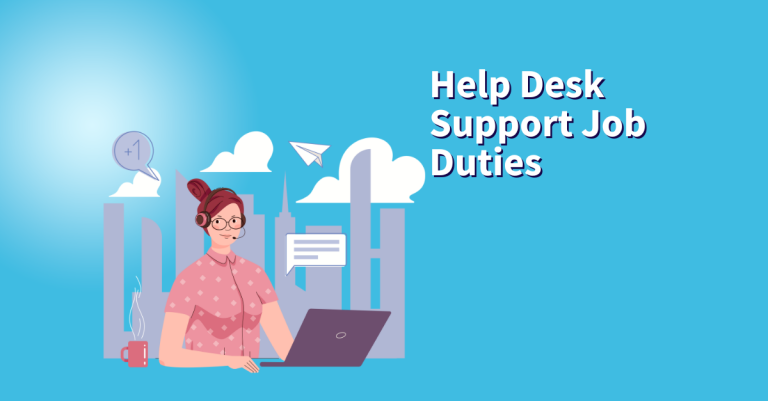Schedule a FREE call with our outsourcing expert now and get a precise quotation that meets your requirements. Don't wait - get started today!
Technical skills alone don’t make a great help desk professional. While knowing how to troubleshoot issues is important, the best support teams go beyond fixing problems. They listen, communicate clearly, and stay patient—even in high-pressure situations.
Help desk professionals are often the first point of contact when something goes wrong. Whether it’s a crashed system, a forgotten password, or a complex software glitch, they must quickly assess the situation and provide a solution. However, resolving technical issues is only part of the job. A frustrated user won’t just remember if their problem was solved—they’ll remember how they were treated in the process.
So, what sets top help desk professionals apart? It’s a mix of problem-solving abilities, customer service skills, and a willingness to learn. Let’s explore the key traits that make them stand out.
The Skills That Set Exceptional Help Desk Professionals Apart
Technical skills matter, but they’re just one piece of the puzzle. The best help desk professionals combine problem-solving abilities, communication skills, and a customer-first mindset to provide top-notch support. Without these qualities, even the most knowledgeable IT expert can struggle to deliver a great user experience.
So, what makes some help desk professionals stand out? Let’s break it down.
1. Empathy and Patience in Customer Service
Technology issues can be frustrating, and users often feel stressed or overwhelmed. A skilled help desk professional doesn’t just focus on fixing the problem—they also acknowledge the user’s frustration and provide reassurance. Staying calm and patient, even when faced with difficult conversations, helps turn a negative experience into a positive one. How a user feels during a support call often matters just as much as the solution itself.
2. Analytical Thinking for Effective Problem-Solving
Every technical issue is like a puzzle with missing pieces. Without the right approach, troubleshooting can feel like guessing in the dark. Help desk professionals analyze symptoms, recognize patterns, and ask the right questions to find the root cause. This ability to think critically and logically leads to faster resolutions and prevents the same issues from happening again.
3. Technical Proficiency with Hardware and Software
Knowing how to use technology isn’t the same as understanding how it works. Help desk professionals need in-depth knowledge of systems, networks, and applications to diagnose and fix problems efficiently. But technology is always changing—so continuous learning is a must. Those who stay updated on the latest software, security threats, and troubleshooting techniques provide more effective support and keep businesses running smoothly.
4. Clear Communication for User Guidance
Have you ever been given a technical explanation that made no sense? Many users don’t understand IT jargon, and complex instructions can make troubleshooting even more frustrating. Exceptional help desk professionals translate technical terms into simple, step-by-step guidance that users can follow. Whether explaining a fix over the phone or in an email, clear communication ensures users feel confident and capable.
The Problem-Solving Framework Behind Help Desk Support
Step 1: Initial Assessment – Understanding the Issue
The first step is identifying the problem. Help desk professionals ask targeted questions to gather details about what’s wrong, when it started, and any recent changes that may have caused it. Active listening is essential, as users may not always describe issues clearly. A thorough initial assessment prevents unnecessary troubleshooting and speeds up resolution.
Step 2: Research and Analysis – Finding the Right Solution
Not every issue has an immediate fix. Support teams analyze symptoms, check internal documentation, and collaborate with colleagues to determine the best course of action. Sometimes, they may need to replicate the problem or consult vendor resources. This investigative approach helps ensure the solution is accurate and prevents recurring issues.
Step 3: Implementation – Applying the Fix
Once a solution is identified, it’s time to act. This might involve installing software updates, adjusting system settings, or guiding users through troubleshooting steps. For complex issues, professionals ensure minimal disruption by scheduling fixes at the right time. Effective communication during this stage reassures users and helps them understand what’s being done.
Step 4: Follow-Up – Ensuring Long-Term Resolution
Fixing the problem isn’t the final step. Help desk teams follow up to confirm the issue is fully resolved and check if users need further assistance. They may also provide guidance on preventing similar problems in the future. This proactive approach builds trust, improves user satisfaction, and reduces repeated support requests.
The Skills That Set Exceptional Help Desk Professionals Apart
Being good at fixing technical issues isn’t enough. The best help desk professionals combine technical expertise with problem-solving, communication, and customer service skills. These abilities help them resolve issues quickly while keeping users satisfied.
What makes some professionals stand out? Let’s take a look at the key skills that define exceptional help desk support.
1. Empathy and Patience in Customer Service
Technology problems can be frustrating, and users often feel stressed when things don’t work as expected. A great help desk professional listens attentively, acknowledges concerns, and reassures users while working on a solution. Even in high-pressure situations, staying patient creates a more positive experience and builds trust.
2. Analytical Thinking for Effective Problem-Solving
Every technical issue is like a puzzle waiting to be solved. Identifying patterns, analyzing symptoms, and pinpointing the root cause requires problem-solving skills. The ability to think critically and methodically ensures faster resolutions and fewer recurring issues.
3. Technical Proficiency with Hardware and Software
A strong grasp of systems, networks, and applications is essential for diagnosing and fixing problems. Help desk professionals must stay updated on the latest technology, security threats, and troubleshooting methods. The more they know, the quicker they can resolve issues and prevent future disruptions.
4. Clear Communication for User Guidance
Many users struggle with technical jargon, making troubleshooting even more challenging. Help desk professionals simplify complex concepts using clear instructions that anyone can follow. Effective communication ensures users feel confident and informed, whether explaining a fix over the phone or through email.

The Human Side of Help Desk Support
Help desk support solves technical problems to create a smooth user experience. A well-handled support interaction can ease frustration and build trust. Clear communication, patience, and efficiency help turn challenges into positive interactions.
-
Building Strong User Relationships
What makes a help desk experience memorable? Users appreciate when support teams listen, explain things clearly, and follow up to ensure issues are resolved. When IT teams build trust, users feel comfortable asking for help, leading to smoother interactions and fewer recurring problems.
-
Handling Difficult Conversations with Patience
How should support teams respond when users are frustrated? Staying calm, listening carefully, and asking clarifying questions can help de-escalate tense situations. A patient approach reassures users that their concerns matter, turning a negative experience into a productive one.
-
Balancing Empathy with Efficiency
How can IT teams be understanding without delaying solutions? Acknowledging frustration while sticking to structured troubleshooting keeps the process moving. A simple statement like, “I understand this is frustrating—I’ll guide you step by step,” helps users feel supported without wasting time.
-
Managing Expectations in Critical Situations
What happens when a problem can’t be fixed right away? Users want fast answers, but honesty is more important than false promises. Setting clear timelines, providing updates, and offering temporary solutions keep users informed and reduce stress.
Challenges That Make or Break a Help Desk Professional
Working in a help desk role requires more than technical knowledge. It demands problem-solving, adaptability, and strong communication skills. Every day brings different challenges, from managing urgent issues to guiding users through unfamiliar technology.
1. Handling High-Stress Situations
System outages and cybersecurity incidents require quick decision-making under pressure. Users expect immediate solutions, and delays can lead to frustration or financial losses. A skilled help desk professional follows response protocols, stays composed, and provides clear updates to keep operations running smoothly.
2. Managing a Constant Flow of Requests
Some days, the ticket queue keeps growing with no sign of slowing down. With multiple issues simultaneously, prioritizing tasks while maintaining quality service is essential. Strong time management and problem-solving skills help address urgent matters without overlooking other requests.
3. Communicating with Non-Technical Users
Users often struggle to describe technical issues, making troubleshooting more difficult. Asking the right questions and simplifying solutions helps bridge the gap. When professionals explain things in a way that is easy to understand, users feel more confident, and problems get resolved faster.
4. Keeping Up with Ever-Changing Technology
Technology evolves constantly, bringing new tools, security risks, and industry updates. Staying informed is necessary to troubleshoot effectively and provide relevant solutions. A strong help desk professional takes the initiative to learn, adapt, and apply new knowledge to improve support.
The Human Side of Help Desk Support
Technical skills are essential in IT support, but the human touch makes all the difference. A help desk that prioritizes clear communication, patience, and empathy creates a smoother experience for users and fosters a positive work environment.
1. Building Strong User Relationships
A great help desk experience builds trust and improves employee satisfaction. When users feel heard and supported, they are more likely to see IT teams as partners rather than barriers to their work. Simple actions like active listening, clear explanations, and friendly interactions can turn everyday support calls into moments of connection.
2. Handling Difficult Conversations with Patience
Not all users respond well to technical challenges—help desk professionals must stay patient. Frustrated users may vent their emotions, but a calm, understanding approach can de-escalate tense situations. By listening attentively, validating concerns, and offering simple solutions, support agents can turn negative interactions into positive experiences.
3. Balancing Empathy with Efficiency
Understanding user frustration while sticking to protocols is key to practical support. While it’s important to show compassion, IT teams must ensure that troubleshooting follows a structured and timely process. Finding the right balance helps maintain both user satisfaction and service efficiency.
4. Managing Expectations in Critical Situations
Help desk teams must set realistic timelines for issue resolution, especially in high-pressure moments. Users appreciate transparency, so clear communication about wait times and progress updates can prevent frustration. By keeping expectations in check and offering alternative solutions when needed, support agents can ease tensions and maintain trust.
Your Business Deserves Smarter Support.
Help desk support is vital for small and medium-sized businesses. It fixes technical problems quickly, reduces downtime, and keeps operations running smoothly. When issues are resolved fast, employees stay productive, and customers stay happy and loyal. Plus, documenting solutions saves time and effort in the future.
At Magellan Solutions, we specialize in providing top-notch help desk support services designed for SMEs. Our team handles everything from managing desk tickets and resolving technical issues to offering ongoing support to users. We ensure your business runs efficiently, your employees stay focused, and your customers remain satisfied.
Book your FREE 60-minute business consultation today! Let’s work together to streamline your operations—NO COMMITMENTS, just results-driven insights. From troubleshooting hardware and software to building a knowledge base for future efficiency, we’ve got you covered. Elevate your business with Magellan Solutions!













